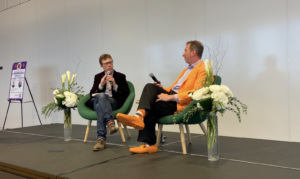Unbecoming To Become an Effective Service Leader
December 3, 2024
Drawing from the work of developmental psychologist Robert Kegan, individuals continue to develop psychologically throughout their lives, moving through distinct stages of mental complexity.
Written by: Dee Kayalar Polat, Director of Alumni Engagement, Questrom School of Business
In today’s rapidly evolving business landscape as organizations increasingly rely on AI to produce value, we will need to reimagine traditional paradigms of leadership. This requires a deeper understanding of how our consciousness and self-awareness shape leadership effectiveness. While much of current-day leadership development focuses on acquiring new skills or techniques, I have always felt that leadership development at its core is about fostering a deeper awareness of how our unconscious patterns of thinking and being drive our behavior.

Drawing from the work of developmental psychologist Robert Kegan, individuals continue to develop psychologically throughout their lives, moving through distinct stages of mental complexity. The first stage, the “socialized mind,” characterizes leaders whose actions are primarily driven by external forces and unconscious patterns. These leaders, often found among emerging professionals lack a strong inner connection and operate from memorized patterns of thinking and feeling. They experience life as something that happens to them, rather than something they actively shape.
The transition to the “self-authoring mind” marks a significant evolution in leadership capability. These leaders shift their orientation from outward to inward, developing a clear sense of personal direction and purpose. They ask themselves what their teams truly need and consider how to communicate effectively to achieve their goals. While this is a phenomenal shift, these leaders may still have blind spots that limit their effectiveness.
The highest stage, the “self-transforming mind,” represents the highest stage of leadership development, what Amber Setter, a CPA turned professional certified coach with the ICF, likens to the navigation system “Waze.” Leaders in this category are open to new routes and destinations. They can dynamically adjust their approach as circumstances change. They demonstrate flexibility and are equally comfortable leading from the front or supporting from behind. These leaders create safe spaces where others can flourish and show up as their authentic selves.
Understanding this developmental journey has profound implications for how we approach leadership development in organizations. It behooves organizations to create environments that encourage authentic dialogue and regular community check-ins. As leaders, we need to recognize when we are operating from unconscious patterns (socialized mind) versus leading from a place of conscious intention, purpose, and connection.
Marshall Goldsmith, a top-rated executive coach, provides a helpful blueprint for cultivating what I like to call service leadership where the goal of the leader is to serve rather than being served, to lead by example, and to empower others to thrive. According to Goldsmith, there are simple things we can do to develop as a service leader. Among others, these include (1) seeking regular feedback from key stakeholders in our professional and personal life, asking what can I do to be a better leader/partner/colleague, (2) regularly assessing our delegation practices, asking direct reports where we could be more or less involved, (3) building self-awareness by thoughtfully examining our intentions, assumptions, abilities, and needs, (4) cultivating empathy with boundaries, knowing when empathy might be creating unhealthy dependencies, and (5) balancing empathy with maintaining clear decision making boundaries.
The future of leadership is about unbecoming all the ways of doing and being that no longer serves us, and instead it’s rerouting in the moment (to go with Amber’s brilliant analogy), seeking feedback, embracing growth, and leading with purpose and connection. As we navigate this path, our success will be measured not just by what we achieve, but by our capacity to create spaces where others feel valued, competent, and confident.
Written by: Dee Kayalar Polat, Director of Alumni Engagement, Questrom School of Business
References: Goldsmith, M., and Reiter, M. The Earned Life: Lose Regret, Choose Fulfillment. Penguin Books. 2022.
Kegan, R. The evolving self: Problem and Process in Human Development. Harvard University Press. 1982



